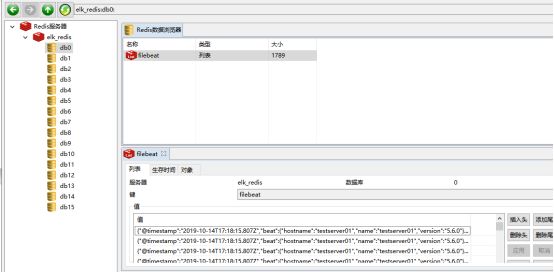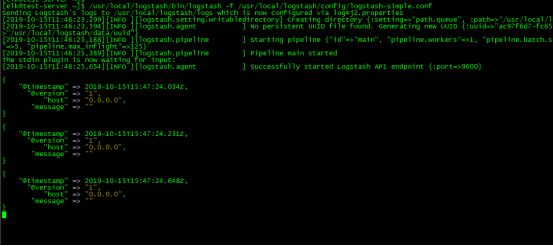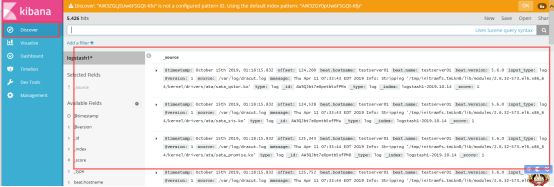1.简介
官网地址:https://www.elastic.co/cn/
官网权威指南:https://www.elastic.co/guide/cn/elasticsearch/guide/current/index.html
安装指南:https://www.elastic.co/guide/en/elasticsearch/reference/5.x/rpm.html
本文word文档以及安装包下载链接:
ELK是Elasticsearch、Logstash、Kibana的简称,这三者是核心套件,但并非全部。
Elasticsearch是实时全文搜索和分析引擎,提供搜集、分析、存储数据三大功能;是一套开放REST和JAVA API等结构提供高效搜索功能,可扩展的分布式系统。它构建于Apache Lucene搜索引擎库之上。
Logstash是一个用来搜集、分析、过滤日志的工具。它支持几乎任何类型的日志,包括系统日志、错误日志和自定义应用程序日志。它可以从许多来源接收日志,这些来源包括 syslog、消息传递(例如 RabbitMQ)和JMX,它能够以多种方式输出数据,包括电子邮件、websockets和Elasticsearch。
Kibana是一个基于Web的图形界面,用于搜索、分析和可视化存储在 Elasticsearch指标中的日志数据。它利用Elasticsearch的REST接口来检索数据,不仅允许用户创建他们自己的数据的定制仪表板视图,还允许他们以特殊的方式查询和过滤数据
Redis REmote DIctionary Server(Redis) 是一个由Salvatore Sanfilippo写的key-value存储系统。
Redis是一个开源的使用ANSI C语言编写、遵守BSD协议、支持网络、可基于内存亦可持久化的日志型、Key-Value数据库,并提供多种语言的API。
它通常被称为数据结构服务器,因为值(value)可以是 字符串(String), 哈希(Hash), 列表(list), 集合(sets) 和 有序集合(sorted sets)等类型,在ELK套件中作为数据临时存储的作用。
Filebeat是本地文件的日志数据采集器。 作为服务器上的代理安装,Filebeat监视日志目录或特定日志文件,tail file,并将它们转发给Elasticsearch或Logstash进行索引、kafka 等。
2.本次使用框架
3.安装
3.1 filebeat安装
安装包:
filebeat-5.6.0-linux-x86_64.tar.gz
tar -xzvf filebeat-5.6.0-linux-x86_64.tar.gz mv filebeat-5.6.0-linux-x86_64 filebeat cd filebeat 编辑配置文件--> filebeat.yml 添加收集日志文件,导入redis ##input #------------------------------ Log prospector -------------------------------- - input_type: log # Paths that should be crawled and fetched. Glob based paths. # To fetch all ".log" files from a specific level of subdirectories # /var/log/*/*.log can be used. # For each file found under this path, a harvester is started. # Make sure not file is defined twice as this can lead to unexpected behaviour. paths: - /var/log/*.log #- c:\programdata\elasticsearch\logs\* ##output #------------------------------- Redis output ---------------------------------- output.redis: # Boolean flag to enable or disable the output module. enabled: true # The list of Redis servers to connect to. If load balancing is enabled, the # events are distributed to the servers in the list. If one server becomes # unreachable, the events are distributed to the reachable servers only. hosts: ["192.168.1.110"] # The Redis port to use if hosts does not contain a port number. The default # is 6379. port: 6379 # The name of the Redis list or channel the events are published to. The # default is filebeat. key: filebeat # The password to authenticate with. The default is no authentication. password: xian123 # The Redis database number where the events are published. The default is 0. db: 0 # The Redis data type to use for publishing events. If the data type is list, # the Redis RPUSH command is used. If the data type is channel, the Redis # PUBLISH command is used. The default value is list. datatype: list # The number of workers to use for each host configured to publish events to # Redis. Use this setting along with the loadbalance option. For example, if # you have 2 hosts and 3 workers, in total 6 workers are started (3 for each # host). worker: 1 # If set to true and multiple hosts or workers are configured, the output # plugin load balances published events onto all Redis hosts. If set to false, # the output plugin sends all events to only one host (determined at random) # and will switch to another host if the currently selected one becomes # unreachable. The default value is true. loadbalance: true # The Redis connection timeout in seconds. The default is 5 seconds. timeout: 5s # The number of times to retry publishing an event after a publishing failure. # After the specified number of retries, the events are typically dropped. # Some Beats, such as Filebeat, ignore the max_retries setting and retry until # all events are published. Set max_retries to a value less than 0 to retry # until all events are published. The default is 3. #max_retries: 3
redis安装
安装包:
redis-5.0.4.tar.gz
tar -xzvf redis-5.0.4.tar.gz cd redis-5.0.4 Make && make install Vi redis.conf 设置绑定端口bind ip,密码requirepass “密码” 启动 cd src ./redis-server ../redis.conf & 启动filebeat cd /home/elk/filebeat ./filebeat -e -c filebeat.yml > /dev/null & 查看redis是否有日志
如有数据表示可以收集日志并导入redis,如无数据表示安装配置有问题;
下面是安装elasticsearch,建议内存够大,因为这个组件极耗内存
安装jdk tar -xvzf jdk-8u91-linux-x64.tar.gz ln -s /home/elk/jdk1.8.0_91 /usr/local/jdk 编辑环境变量 vim /etc/profile JAVA_HOME=/usr/local/jdk export JRE_HOME=/usr/local/jdk/jre/ export CLASSPATH=.:$JAVA_HOME/lib:$JRE_HOME/lib:$CLASSPATHexport PATH=$PATH:$JAVA_HOME/bin:$JRE_HOME/bin 验证: #Java -version java version "1.8.0_91" Java(TM) SE Runtime Environment (build 1.8.0_91-b14) Java HotSpot(TM) 64-Bit Server VM (build 25.91-b14, mixed mode) 安装elasticsearch Unzip elasticsearch-5.6.3.zip mv elasticsearch-5.6.3 elasticsearch cd elasticsearch/config/ vi elasticsearch.yml # ======================== Elasticsearch Configuration ========================= # # NOTE: Elasticsearch comes with reasonable defaults for most settings. # Before you set out to tweak and tune the configuration, make sure you # understand what are you trying to accomplish and the consequences. # # The primary way of configuring a node is via this file. This template lists # the most important settings you may want to configure for a production cluster. # # Please consult the documentation for further information on configuration options: # https://www.elastic.co/guide/en/elasticsearch/reference/index.html # # ---------------------------------- Cluster ----------------------------------- # # Use a descriptive name for your cluster: # cluster.name: my-application # # ------------------------------------ Node ------------------------------------ # # Use a descriptive name for the node: # node.name: test-server # # Add custom attributes to the node: # #node.attr.rack: r1 # # ----------------------------------- Paths ------------------------------------ # # Path to directory where to store the data (separate multiple locations by comma): # path.data: /opt/data/ # #Path to log files: # path.logs: /opt/logs # # ----------------------------------- Memory ----------------------------------- # # Lock the memory on startup: # #bootstrap.memory_lock: false # # Make sure that the heap size is set to about half the memory available # on the system and that the owner of the process is allowed to use this # limit. # # Elasticsearch performs poorly when the system is swapping the memory. # # ---------------------------------- Network ----------------------------------- # # Set the bind address to a specific IP (IPv4 or IPv6): # network.host: 0.0.0.0 # # Set a custom port for HTTP: # http.port: 9200 # # For more information, consult the network module documentation. # # --------------------------------- Discovery ---------------------------------- # # Pass an initial list of hosts to perform discovery when new node is started: #The default list of hosts is ["192.168.1.100",] # discovery.zen.ping.unicast.hosts: ["192.168.1.100",] # # Prevent the "split brain" by configuring the majority of nodes (total number of master-eligible nodes / 2 + 1): # #discovery.zen.minimum_master_nodes: 3 # # For more information, consult the zen discovery module documentation. # # ---------------------------------- Gateway ----------------------------------- # # Block initial recovery after a full cluster restart until N nodes are started: # #gateway.recover_after_nodes: 3 # # For more information, consult the gateway module documentation. # # ---------------------------------- Various ----------------------------------- http.cors.enabled: true http.cors.allow-origin: "*" bootstrap.memory_lock: false bootstrap.system_call_filter: false # # Require explicit names when deleting indices: # #action.destructive_requires_name: true 修改系统参数,不修改可能达到系统瓶颈,导致软件崩溃 vi /etc/sysctl.conf vm.max_map_count=655360 sysctl –p vi /etc/security/limits.conf * soft nofile 65536 * hard nofile 131072 * soft nproc 65536 * hard nproc 131072 Vi /etc/security/limits.d/20-nproc.conf elk soft nproc 65536 启动组件 cd /home/elk/elasticsearch/bin/ ./elasticsearch >> /dev/null & 验证是否成功 Curl http://192.168.1.100:9200/_search?pretty 接口有数据表示启动没问题
安装logstash:
tar -xzvf logstash-5.3.1.tar.gz 创建软链接 ln -s /home/elk/logstash-5.3.1 /usr/local/logstash 验证 /usr/local/logstash/bin/logstash -e 'input { stdin { } } output { stdout {} }' 建立配置文件 vi /usr/local/logstash/config/logstash-simple.conf input { stdin { } } output { stdout { codec=> rubydebug } } 使用logstash参数-f读取配置文件进行测试: /usr/local/logstash/bin/logstash -f /usr/local/logstash/config/logstash-simple.conf
创建配置文件获取redis日志的数据: 配置文件如下: vi /usr/local/logstash/config/redis-spring.conf input { redis { port => "6379" host => "192.168.1.110" ###redis服务器 data_type => "list" password => "xian123" type => "log" key => "filebeat" db => "0" } } output { elasticsearch hosts => "192.168.1.100:9200" ## index => "logstash1-%{+YYYY.MM.dd}" } } ~ 通过配置文件启动服务查看效果: /usr/local/logstash/bin/logstash -f /usr/local/logstash/config/redis-spring.conf
Redis的数据已经被取完
http://192.168.1.100:9200/_search?pretty 验证url
安装ES插件:(elasticsearch-head)
需要联网
xz node-v8.0.0-linux-x64.tar.xz tar -xvf xz ode-v8.0.0-linux-x64.tar cd node-v8.0.0-linux-x64 [root@test-server bin]# ln -s /home/elk/node-v8.0.0-linux-x64/bin/node /usr/local/bin/node [root@test-server bin]# ln -s /home/elk/node-v8.0.0-linux-x64/bin/npm /usr/local/bin/npm tar -xvjf phantomjs-2.1.1-linux-x86_64.tar.bz2 cd /home/elk/phantomjs-2.1.1-linux-x86_64/bin/ ln -s /home/elk/phantomjs-2.1.1-linux-x86_64/bin/phantomjs /usr/local/bin/phantomjs unzip master.zip cd elasticsearch-head-master npm install -g cnpm --registry=https://registry.npm.taobao.org npm install grunt --save npm install -g cnpm --registry=https://registry.npm.taobao.org npm install grunt --save npm install grunt-contrib-clean --registry=https://registry.npm.taobao.org npm install grunt-contrib-concat --registry=https://registry.npm.taobao.org npm install grunt-contrib-watch --registry=https://registry.npm.taobao.org npm install grunt-contrib-connect --registry=https://registry.npm.taobao.org npm install grunt-contrib-copy --registry=https://registry.npm.taobao.org npm install grunt-contrib-jasmine --registry=https://registry.npm.taobao.org npm install npm run start & 查看端口状态:(端口默认9100) netstat –anpt | grep 9100
查看是否有日志:
安装kibana
tar -xzvf kibana-5.6.8-linux-x86_64.tar.gz cd kibana-5.6.8-linux-x86_64 按需修改配置文件 vi config/kibana.yml
按需修改配置文件
浏览器打开:http://IP:5601
配置获取Elasticsearch日志
创建完index之后返回看看是否有日志
如上图表示已经获取到日志并展示;










